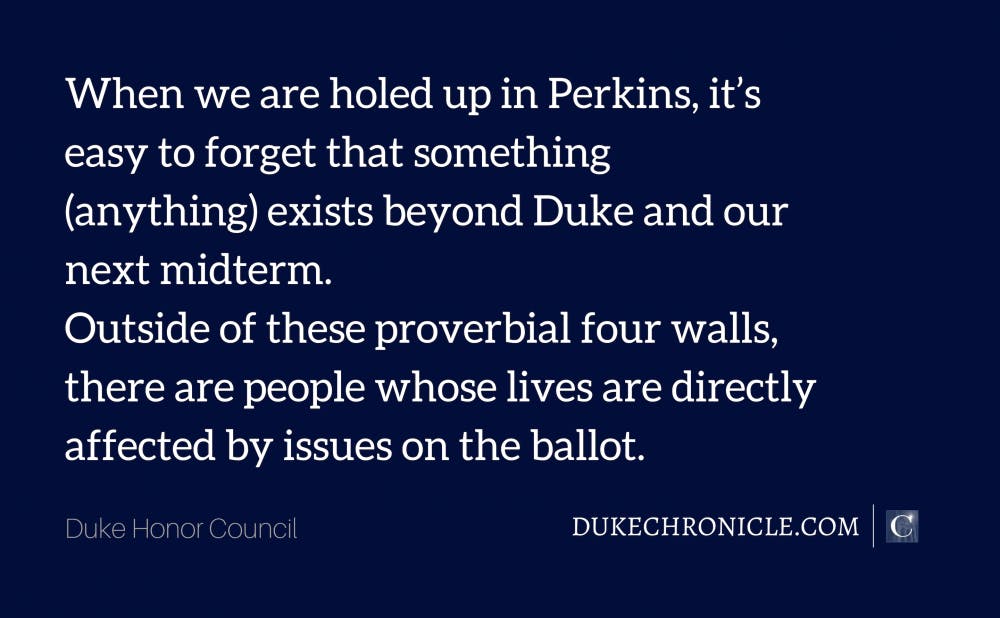Virtually every student knows about the first line of the Community Standard. When students are asked about the Standard, even the vaguest answers will often come close to the first line saying something along the lines of, “It has something to do with not lying or stealing, right?” Though the Community Standard does apply to academic honesty and integrity, it also applies to so much more. The second and third lines say, “I will conduct myself honorably in all my endeavors and I will act if the Standard is compromised.” “Acting” can take many forms, but one of the most tangible forms it can take is voting. Many people say that it is your ‘moral and civic duty’ to vote, but nobody ever really explains why. In honor of Honor Council’s theme of civic engagement this month, here are my top five reasons you should vote:
1. Everyone deserves to have their voice heard
One of the greatest parts about Duke is the notable diversity of the student body. Every individual on this campus brings with them a wealth of knowledge, derived from unique experiences. With every new voice that enters the Duke community, a new, worthy and notable perspective is added to our collective knowledge. It is each of our individual voices that builds this institution and what shapes our communities. Voting, by the same virtue, allows each one of us to express our individual voice on a host of topics that affect our communities. Voting is the most concrete way to show politicians and others in charge what issues really matter and how they affect you. Without voting, your views and perspectives effectively remain untold to the government, causing the government to overlook you and your interests. Don’t give up your voice!
2. This will impact you for generations
The bills that become laws today will undoubtedly have a lasting effect on our generation. Voting is one of the only ways to ensure that our vision of what the future should be actually happens. Several sources have found that, though young voters are making up an increasing proportion of the electorate, they are voting at a much lower percentage than other generations. How you vote today as an 18 to 22-year-old could very well shape and define what happens when you are 60, 70 or 80 years old. By not voting, you are relinquishing your right to shape your future and, should you so decide, your potential children’s futures. If young people truly are the future, then they should vote to shape it!
3. Voter suppression is a real problem
The United States has a long history of denying groups of people the right to vote through voter suppression laws, including through literacy tests and grandfather clauses. Despite how ‘ancient’ this may seem, these forms of voter suppression existed within the lifetime of many of our parents and grandparents. North Carolina has not always been a place where people of every color, creed and gender could vote; even now there are controversial ballot measures that directly affect individual voting rights in North Carolina and other states that warrant attention and discussion. It is more important than ever to vote when we have the chance, because many who came before us did not have that opportunity.
4. Life exists beyond the Duke bubble
When we are holed up in Perkins, it’s easy to forget that something (anything) exists beyond Duke and our next midterm. Outside of these proverbial four walls, there are people whose lives are directly affected by issues on the ballot. There are ballot measures that affect schooling, federal funding for parks and roadways, and so many more items that directly impact our communities. Many different legislative changes appear on the ballot this midterm that are as important as, if not more important than, choosing specific candidates for office. If and when you vote, don’t just focus on the big-ticket items, because it is the smaller, less publicized ballot measures that have the most lasting impact.
5. It’s in the Community Standard
Last, but not least, the Community Standard implores us as members of the Duke community to “conduct ourselves honorably in all of our endeavors and to act when the standard is compromised.” If there are laws or other institutions that you feel violate your unalienable rights, go out and vote to change it. Acting when you see something wrong or that could be done better is your moral responsibility as a member of the Duke community. If you feel even more strongly about an issue, go out and volunteer, petition and voice your concern to give others the opportunity to vote and act when the standard is compromised. By voting, you are playing a crucial role in shaping future generations, and it is your right and duty to make your voice heard. Our very own Duke Community Standard, which helps define what we as a community view as moral and just, was itself defined and evolved through a series of votes early in its conception. The best and easiest way to act is to vote!
Even though students at Duke and our peer institutions don’t always enjoy being inundated with messages about voting, it is extremely important that students not only recognize the need to vote, but actually do turn out to vote. Educate yourself on the policies and the candidates so that you may tackle this endeavor honorably. No matter which party or platform you support, voting is the best way to make a change. As Dr. Seuss wrote, “So, open your mouth, lad! For every voice counts!” So Duke students, go out, vote and make your voice heard!
This week’s column was written by Trinity junior Matthew Gayed.
Get The Chronicle straight to your inbox
Signup for our weekly newsletter. Cancel at any time.
Kushal Kudakia, President of Duke Honor Council, is a Trinity junior. his column for Duke Honor Council runs on alternate Fridays.

